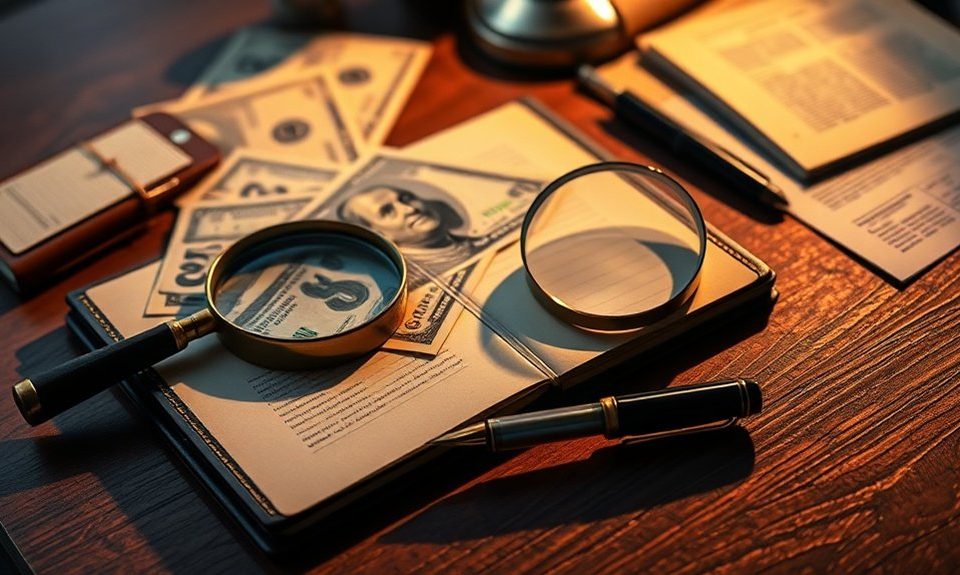In an increasingly complex world, the demand for discreet and professional investigative services has become more critical than ever.
Whether individuals are addressing personal matters such as infidelity or navigating corporate disputes, engaging a private investigator can provide the necessary expertise and resources to uncover the truth.
This article examines the roles and responsibilities of private investigators, highlights the critical nature of their skills, and presents the top ten reasons for considering their services.
Learn how a professional investigator can deliver peace of mind and clarity in uncertain situations.
What is a Private Investigator?
A private investigator (PI) is a licensed professional specializing in a variety of investigative services, utilizing a distinct combination of skills and expertise to address complex cases that encompass both corporate inquiries and personal matters.
Private investigators frequently engage in surveillance, evidence collection, background checks, and fraud detection, all while maintaining rigorous ethical standards and confidentiality protocols. Their responsibilities may also extend to digital forensics, witness interviews, and comprehensive case analysis, ultimately equipping clients with the necessary information to manage legal issues or personal safety concerns effectively.
Why Hire a Professional Private Investigator?
Engaging a professional private investigator provides numerous advantages that can greatly improve the quality and effectiveness of any investigation, whether it pertains to personal matters, corporate issues, or legal disputes.
Professional private investigators possess extensive expertise and a diverse skill set, ensuring that each case is managed with the highest level of discretion and thoroughness. Their in-depth understanding of local laws, investigative methodologies, and access to advanced resources enables them to conduct comprehensive investigations. This approach delivers reliable results that enhance peace of mind and bolster credibility.
1. Expertise and Experience
The expertise and experience of a private investigator represent critical assets that can significantly influence the outcome of any investigation. Licensed investigators possess specialized knowledge in various investigative techniques, such as surveillance technology, background checks, and fraud detection, which enables them to approach cases with a strategic mindset.
Their analytical skills facilitate the efficient processing of complex information, ensuring thoroughness and attention to detail in every aspect of the investigation.
This combination of practical skills and analytical capabilities translates into effective case management that not only expedites resolution but also enhances the accuracy of findings. For example, the use of covert surveillance allows investigators to gather real-time evidence, while comprehensive background checks uncover essential details that can direct the investigation appropriately.
Additionally, employing data analysis software assists in synthesizing large volumes of information, ensuring that no relevant details are overlooked. By critically assessing the gathered evidence, investigators are able to make informed decisions that guide the investigation’s trajectory, ultimately leading to more favorable outcomes for their clients.
2. Access to Resources and Technology
One of the significant advantages of engaging a private investigator is their access to essential resources and advanced technology that are not readily available to the general public. Professional investigators employ tools such as digital forensics, surveillance technology, and public records searches to efficiently gather critical evidence. This access allows them to conduct thorough investigations, whether for asset recovery, infidelity cases, or corporate fraud detection, thereby providing their clients with a comprehensive understanding of the situation.
These experts utilize electronic surveillance systems, facilitating real-time monitoring and the ability to capture crucial evidence that can substantially influence case outcomes. Through meticulous case analysis, they can identify patterns and connections that may not be immediately apparent. Their strategic planning skills further enhance the effectiveness of the investigation, ensuring that each action taken is purposeful and directed toward the collection of the most relevant information.
By employing a combination of these advanced techniques, private investigators deliver invaluable services that give the power to their clients with knowledge and clarity in complex situations.
3. Objectivity and Unbiased Investigation
Objectivity and an unbiased approach are essential characteristics of a professional private investigator, particularly when addressing sensitive cases that involve legal matters or personal disputes. By maintaining a neutral perspective, licensed investigators can gather credible evidence without the interference of emotional factors, ensuring that their findings are both factual and reliable. This objectivity is especially important in scenarios such as child custody disputes or litigation support, where impartiality can significantly influence the outcomes.
In these situations, the investigator’s ability to remain detached from personal feelings and biases is crucial, as the ramifications of their findings can have a profound impact on individuals’ lives. For example, in workplace investigations concerning harassment claims, an unbiased approach guarantees that all evidence is assessed fairly, which not only upholds ethical standards but also ensures legal compliance.
In the context of fraud investigations, objectivity is instrumental in preventing preconceived notions from obstructing the discovery of truth. Ultimately, the integrity of an investigation relies on the investigator’s unwavering commitment to objectivity, as this fosters trust and reliability in the findings presented.
4. Adherence to Legal and Ethical Standards
Adhering to legal and ethical standards is a fundamental principle that guides the practice of private investigators, ensuring that all investigations are conducted with integrity and respect for client confidentiality. Licensed investigators possess comprehensive knowledge of the local laws and regulations governing their work, which not only safeguards their clients but also upholds the credibility of their findings. This commitment to professional ethics is essential for maintaining trust and accountability within the investigative process.
By prioritizing legal compliance, private investigators enhance the overall quality of service provided to clients, demonstrating a commitment to responsible practices that extend beyond mere fact-finding. Clients can have confidence that their sensitive information is handled with the utmost care, fostering a sense of security during what is often a stressful time.
This ethical framework not only protects the interests of clients but also establishes a standard for the industry, as investigators who adhere to these principles contribute to a culture of professionalism that benefits all stakeholders involved.
5. Time and Cost Efficiency
Engaging a private investigator can yield significant efficiencies in both time and cost, ensuring that investigations are conducted promptly and effectively. By leveraging their expertise and resources, professional investigators can streamline the investigation timeline, enabling clients to achieve results more swiftly than if they were to undertake the investigation independently.
This cost-effectiveness is especially advantageous in complex scenarios such as corporate investigations or insurance claims, where delays can result in substantial financial consequences.
Many clients underestimate the potential pitfalls of a do-it-yourself approach, which can lead to wasted hours and unforeseen expenses. Investigations that initially appear straightforward can quickly become complex, resulting in escalating costs for tools, travel, and potentially even legal fees if not handled properly.
A private investigator typically possesses the experience necessary to evaluate a case efficiently, often concluding inquiries within a matter of weeks, as opposed to the months it might take an untrained individual. This reduced timeline not only alleviates unnecessary stress but also mitigates the hidden costs that may arise from inadequate investigative methods.
What Are the Top 10 Reasons to Hire a Professional Private Investigator?
Understanding the primary reasons for hiring a professional private investigator is essential for individuals and businesses seeking to make informed decisions regarding cases that necessitate specialized investigation.
Engaging a licensed investigator offers numerous benefits, including their extensive expertise in a variety of investigative services and the capacity to deliver peace of mind through comprehensive and discreet investigations.
Whether addressing issues such as infidelity cases, corporate fraud detection, or child custody disputes, the advantages of utilizing professional investigative services are considerable and can contribute to favorable outcomes.
1. Infidelity and Cheating Spouse Investigations
Infidelity and investigations of cheating spouses represent some of the most prevalent reasons clients engage the services of a private investigator. These situations necessitate discreet evidence gathering and comprehensive analysis to verify suspicions. A licensed investigator employs surveillance techniques and strategic planning to document behaviors, thereby providing clients with the assurance required to address their concerns. This meticulous approach ensures that the investigation is conducted in a professional and ethical manner, protecting the client’s emotional well-being.
In such sensitive cases, maintaining confidentiality is of utmost importance. Private investigators utilize a variety of methods—including covert surveillance and background checks—specifically designed to uncover the truth without alerting the individual in question. By employing advanced technology, investigators can capture crucial information while ensuring the investigation remains unobtrusive. They prioritize discretion, thereby safeguarding the integrity of client relationships.
By focusing on professionalism and emotional sensitivity throughout the investigative process, these experts equip clients with the clarity necessary to make informed decisions regarding their personal lives.
2. Background Checks and Pre-Employment Screening
Background checks and pre-employment screening are essential services provided by private investigators, enabling individuals and organizations to make informed hiring decisions based on a candidate’s history. A comprehensive vetting process can uncover critical information, including criminal records and employment history, which are vital for maintaining workplace safety and integrity.
By utilizing their investigative techniques and meticulous attention to detail, licensed investigators deliver reliable assessments that can mitigate hiring risks for businesses.
Beyond corporate hiring, background checks also hold significant importance in personal relationships, particularly when individuals seek to establish new connections. In both romantic contexts and new friendships, individuals frequently desire assurance regarding a potential partner’s character and reliability.
Collecting information such as past relationships, credit history, and social media activity can help construct a clearer understanding of an individual’s background.
This diligent vetting process not only fosters trust but also serves to prevent adverse experiences in the future, thereby underscoring the critical significance of thorough background investigations across various facets of life.
3. Fraud and Insurance Investigations
Fraud and insurance investigations represent critical areas of specialization for private investigators, whose expertise in evidence gathering is essential for uncovering dishonest activities. Licensed investigators employ advanced surveillance techniques and analytical skills to document fraudulent claims, enabling clients to maintain their credibility and protect their interests. Their comprehensive understanding of legal matters facilitates navigation through complex cases that may entail significant financial implications.
These professionals utilize a combination of methods, including interviews, background checks, and data analysis, to construct a thorough understanding of the situation at hand. By meticulously examining every detail, they make substantial contributions to the fight against fraud, which ultimately affects the insurance industry and public trust on a larger scale.
Their commitment to thoroughness ensures that any evidence collected is both reliable and admissible in court, give the power toing clients to pursue potential legal action when necessary. The role of private investigators in this context transcends merely apprehending wrongdoers; it encompasses the safeguarding of the integrity of systems upon which individuals and businesses rely daily.
4. Missing Person and Skip Tracing
Investigating missing persons and employing skip tracing methods constitute essential services offered by private investigators, who are equipped with specialized techniques for locating individuals. Whether the objective is to find a long-lost relative or a witness, licensed investigators leverage their professional networks and resources to track down leads and gather pertinent information. Their client-focused approach ensures that the needs and concerns of those seeking closure are prioritized throughout the investigative process.
These investigations typically involve a combination of traditional methods, such as interviewing friends or family members, alongside technological tools like social media analysis and data mining.
Emotional sensitivity is of utmost importance, as individuals involved may experience feelings of anxiety, helplessness, or uncertainty. Investigators must navigate these delicate emotions while remaining dedicated to their mission, emphasizing the need for compassionate communication.
This holistic, client-centered perspective fosters an environment in which clients feel heard and understood, significantly enhancing the overall effectiveness of the search and assisting them in processing the often-turbulent journey of seeking missing loved ones.
5. Child Custody and Support Investigations
Child custody and support investigations represent sensitive domains in which private investigators provide critical assistance by gathering evidence that may significantly impact legal outcomes. Licensed investigators utilize surveillance and witness interviews to compile comprehensive reports reflecting the circumstances surrounding custody disputes, thereby prioritizing the best interests of the child. Their expertise in navigating legal matters is invaluable for clients seeking to resolve complex family issues.
The emotional stakes in these cases are exceedingly high, often involving deeply personal narratives that can affect the lives of all parties involved. By employing advanced investigative techniques, such as background checks and digital surveillance, investigators uncover essential information about a parent’s lifestyle, stability, and overall parental capability.
Thorough evidence gathering extends beyond mere data collection; it aims to create a clearer picture that assists attorneys in constructing a robust case. Consequently, skilled investigators play a pivotal role in ensuring that courts receive the information necessary to make equitable custody decisions, ultimately influencing the future well-being of children entangled in such disputes.
6. Surveillance and Evidence Gathering
Surveillance and evidence gathering constitute fundamental components of the investigative process, enabling private investigators to document critical information that supports their clients’ cases. By utilizing advanced surveillance technology and strategic planning, licensed investigators can capture real-time evidence, thereby enhancing the credibility of their findings. This expertise is particularly valuable in matters such as infidelity, fraud detection, and corporate investigations.
Plus traditional methods, including physical observation, private investigators employ a range of advanced techniques, such as digital surveillance and social media monitoring, to identify concealed patterns and behaviors. The effectiveness of these methods is significantly influenced by their capacity to produce credible evidence capable of withstanding scrutiny in legal contexts.
It is essential to navigate the ethical considerations surrounding surveillance, ensuring that privacy rights are upheld while still obtaining the necessary information. Striking a balance between thorough investigation and ethical practices is crucial, as it not only impacts the outcome of a case but also preserves the integrity of the investigative profession.
7. Intellectual Property and Corporate Investigations
Private investigators play an essential role in intellectual property and corporate investigations, utilizing their expertise to identify and mitigate potential threats to business assets. Through comprehensive research and evidence collection, licensed investigators assist companies in safeguarding their proprietary information and navigating complex legal matters. Their proficiency in risk management ensures that organizations are well-prepared to address issues such as theft, fraud, and employee misconduct effectively.
In today’s competitive environment, the protection of intellectual property has become increasingly critical, as businesses encounter heightened risks from both external adversaries and internal threats. Private investigators leverage their extensive training and resources to detect infringements of trademarks, copyrights, and patents, thereby ensuring that a company’s innovations remain secure.
Through meticulous evidence gathering and analysis, they compile comprehensive reports that not only support legal actions but also provide valuable insights into potential vulnerabilities. By collaborating with private investigators, organizations can proactively implement measures that deter intellectual property theft while simultaneously enhancing their overall risk management strategies.
8. Personal Injury and Accident Investigations
Personal injury and accident investigations represent critical areas of focus for private investigators, who gather essential evidence to support clients in their legal claims. Licensed investigators apply their analytical skills and investigative techniques to reconstruct events and document findings that enhance the credibility of client claims. This meticulous attention to detail is crucial for ensuring that clients receive fair compensation for their injuries.
By employing a range of methods, including surveillance, background checks, and interviews with witnesses, private investigators can uncover vital information that may not be readily accessible. They often collaborate with accident reconstruction experts and collect medical records to create a comprehensive understanding of the incident. This thorough approach not only strengthens the client’s case but also establishes a solid foundation of trust with legal representatives.
Ultimately, the efforts of these skilled professionals can significantly influence the outcome of a case, ensuring that clients achieve the justice they rightfully deserve.
9. Security and Risk Assessments
Security and risk assessments are vital services provided by private investigators, who evaluate potential vulnerabilities and recommend strategies to enhance personal safety and organizational security. By leveraging their expertise in situational analysis and strategic planning, licensed investigators can identify risks and develop effective mitigation plans. This proactive approach ensures that clients are well-informed and safeguarded against potential threats.
The process typically begins with a comprehensive review of existing security measures, followed by an in-depth analysis of potential risks. This involves conducting interviews, performing site assessments, and evaluating emergency response plans. A key aspect of this process is adherence to professional ethics, as investigators must maintain impartiality and transparency throughout the assessment.
By prioritizing thoroughness and ethical standards, private investigators not only enhance safety but also foster trust with their clients. Utilizing a range of investigative strategies, they gather critical data and develop tailored solutions that address the specific needs of individuals and organizations, thereby ensuring a robust defense against various threats.
10. Litigation Support and Witness Interviews
Litigation support and witness interviews represent essential services offered by private investigators, who play a pivotal role in gathering vital information for legal cases. Licensed investigators utilize their communication skills and investigative methodologies to conduct comprehensive interviews and compile evidence that can significantly impact case outcomes. Their contributions are invaluable to attorneys and clients navigating complex legal matters.
In the context of legal proceedings, the importance of litigation support cannot be overstated. Investigators employ various strategies to optimize the effectiveness of witness interviews, which include establishing rapport and utilizing open-ended questioning techniques.
Such approaches encourage witnesses to provide detailed accounts while minimizing the potential for leading questions that may distort their recollections. Careful documentation of each interview serves not only as a crucial record of the information obtained but also as a foundation for constructing a compelling case.
The synergy of proficient interviewing and meticulous record-keeping enhances the integrity of the investigation, ultimately providing a more comprehensive understanding of the facts pertinent to the case.
Frequently Asked Questions
What are the top reasons to hire a professional private investigator?
1. Extensive knowledge and training: Professional private investigators have specialized training and experience in various investigative techniques, making them equipped to handle a wide range of cases.
2. Access to resources: Private investigators have access to databases, tools, and other resources that are not available to the general public, allowing them to gather evidence more efficiently.
3. Discretion and confidentiality: Professional investigators are bound by a code of ethics to maintain strict confidentiality and discretion, ensuring that your case and personal information remain secure.
4. Objective and unbiased approach: As an unbiased third party, a private investigator can provide an objective perspective on your case, free from personal bias or emotion.
5. Time and cost-effective: With their expertise and resources, private investigators can often obtain results faster and more cost-effectively than individuals attempting to conduct their own investigations.
6. Legal knowledge: Private investigators are well-versed in laws and regulations related to their field, ensuring that all evidence gathered is admissible in court.
What types of cases can a professional private investigator handle?
1. Infidelity and cheating spouse investigations: Private investigators can gather evidence of an unfaithful partner and provide you with proof of their actions.
2. Background checks: Whether it’s for a potential employee, business partner, or romantic partner, private investigators can conduct thorough background checks to uncover any important information.
3. Missing persons: Private investigators have specialized techniques and resources to locate missing persons, including runaway teens, long-lost family members, and debtors.
4. Fraud and scams: With their knowledge of fraud and scams, private investigators can help you identify and prevent potential fraudulent activities.
5. Corporate and business investigations: Private investigators can assist businesses with employee theft, embezzlement, and other internal investigations.
6. Child custody and support investigations: Private investigators can gather evidence to support child custody or child support cases in court.
Can I conduct my own investigations instead of hiring a private investigator?
Yes, you can conduct your own investigations, but it may not yield the same results as hiring a professional. Private investigators have the training, resources, and experience to gather evidence efficiently and effectively, while individuals may overlook or miss crucial information.
How do I choose the right private investigator for my case?
1. Research: Look for private investigators with experience and training in your specific type of case.
2. Check credentials: Make sure the investigator is licensed, bonded, and insured in your state.
3. Read reviews and testimonials: Check online reviews and ask for references to get an idea of their past clients’ experiences.
4. Discuss fees and contracts: Make sure you have a clear understanding of the fees and any contracts or agreements before hiring a private investigator.
5. Trust your instincts: Ultimately, go with your gut feeling and choose an investigator you feel comfortable working with.
Can I trust the evidence gathered by a private investigator?
Yes, professional private investigators are bound by a code of ethics and laws to gather evidence legally and ethically. They also have the knowledge and experience to ensure that all evidence is admissible in court.
What should I do if I suspect someone is conducting illegal surveillance on me?
If you believe you are being illegally surveilled, contact a professional private investigator to conduct a counter-surveillance investigation. They can identify and eliminate any potential threats and provide you with evidence to pursue legal action if necessary.






